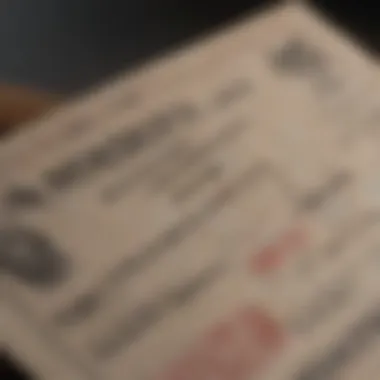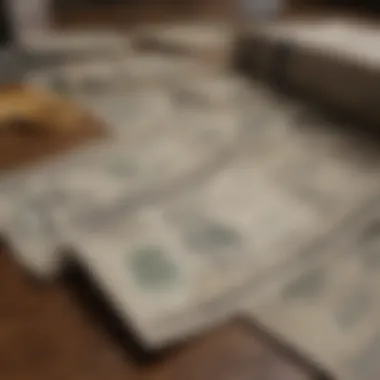Acquiring Money Orders at Kroger: Your Complete Guide


Intro
Money orders are widely used as a secure method of payment. Kroger, a well-known grocery chain in the United States, offers money order services that provide another option for personal finance management. Understanding how to obtain and utilize money orders at Kroger is vital for individuals seeking efficient financial solutions beyond traditional banking services. This guide will navigate you through various aspects, including the process, fees, and advantages related to using money orders at this retailer.
Overview of the Topic
Definition and Importance of the Topic
A money order is a guaranteed form of payment, similar to a check but more secure. It requires the buyer to pay upfront, which can help avoid overdrafts associated with checking accounts. Kroger's offering addresses a specific market need where customers may prefer tangible, secure payment methods for various transactions like bill payments, gift giving, or personal financial planning.
Key Benefits and Implications
Using money orders has several key benefits:
- Security: Money orders cannot bounce, making them a reliable payment method.
- Accessibility: Kroger locations are widespread, ensuring convenience for customers.
- No Bank Account Needed: They cater to those who may not have a traditional bank account but need to manage finances effectively.
- Control over Spending: As users need to pay before obtaining the money order, it promotes careful financial planning.
These benefits underline the significance of understanding the process alongside any limitations that might come with using money orders as a financial tool.
Fee Structure and General Process
Explained Fees at Kroger
The fees associated with acquiring money orders are vital to understand fully. At Kroger, the typical fee is competitive compared to other retailers. However, given the fluctuating store policies, actual fees can vary from one location to another. Some may be as low as $0.70, while others may reach $5. It is advisable to inquire directly at your local store for accurate pricing.
The Buying Process
The steps to acquire a money order at Kroger generally include:
- Visit Kroger store. Locate the customer service desk or the cashier who handles money orders.
- Provide Required Information. Fill out the money order application with necessary details, such as the amount and recipient information.
- Make Payment. Pay the total amount due, including any associated fees. Most Krogers accept various forms of payment like cash, debit cards, and, in some instances, credit cards.
- Keep the Receipt. After acquiring a money order, keep the receipt as proof of purchase.
“Understanding the process effectively lowers the anxiety that sometimes accompanies financial transactions.”
Exploring Strategies and Tips
Practical Tips for Implementation
To enhance your experience with money orders at Kroger, consider these tips:
- Read the Fine Print. Ensure you understand all terms before writing.
- Use Only Visa or MasterCard. If interested in using credit, selecting these brands might mitigate unexpected fees.
- Track Your Spending. Keep a log of your money orders for personal accountability and financial monitoring.
Strategies for Effective Management
Keeping a transparent record of your transactions is crucial. Tools like spreadsheets or personal finance applications can help monitor outgoing funds. Leverage reminders for when payments are due to avoid late fees or fines from service providers.
Expert Insights and Recommendations
Financial experts recommend using money orders as part of a broader personal finance strategy. They can serve specific purposes, such as making purchases that require guaranteed payment or managing household bills on time. Benjamin Graham, noted investor and economist, implied that a secure payment option aids in minimizing financial risk. Therefore, engaging with Kroger's services thoughtfully integrates money orders into robust personal finance management strategies.
Understanding Money Orders
Understanding money orders is crucial in the context of navigating personal finances efficiently. Many individuals encounter situations where they need a secure method of payment that doesn’t involve cash or personal checks. Money orders serve this purpose well, combining the reliability of a bank-backed transaction with the accessibility of purchasing one at retail locations like Kroger.
Money orders represent a straightforward financial tool, widely embraced by those lacking bank accounts or those prefrening to manage budgeting without risk associated with larger funds. They provide a tangible alternative to checks, which can bounce if there are insufficient funds.


Definition and Purpose
A money order is a prepaid negotiable instrument that allows the purchaser to pay a specific amount to a designated payee. Essentially, it functions similarly to a check but offers certain advantages. The chief definition emphasizes that money orders are payment order for a pre-specified sum that can be sent through the mail or delivered in person.
The primary purpose of a money order lies in its reliability. It assures the recipient that the payment is guaranteed, as the amount is prepaid, which reduces the risk of non-payment. For instance, using a money order rather than a personal check if you are sending money to someone reduces the potential issues arising from insufficient funds.
In addition, money orders cater to various scenarios, from paying bills to sending money to family and friends. They are a valuable tool for those without access to traditional banking services, offering a straightforward means of transferring funds without involving cash.
Differences Between Money Orders and Checks
Understanding the difference between money orders and standard checks can help individuals make informed choices about their financial transactions.
- Payment Security: Money orders are more secure than checks. A money order is prepaid, while checks rely on the payer’s account having sufficient funds.
- Accessibility: You can buy money orders at many retail locations like Kroger without needing a checking account. In contrast, most types of checks come from a bank account.
- Limits: Money orders often have maximum amounts they can carry, usually capped at $1,000 in the United States. Meanwhile, check amounts can vary widely without such strict limitations.
- Record Keeping: Money orders offer straightforward receipts that serve as proof of payment. Checks, while they can be tracked through banking records, do not always guarantee that the recipient will cash them.
Money orders represent a significant alternative financial tool that offers measurable benefits for managing personal finances effectively.
Kroger's Financial Services
Kroger is not just a grocery store. It offers a range of financial services that cater to a diverse customer base. Providing money orders is just one illustration of how Kroger plays a vital role in modern financial transactions. The availability of these services enhances accessibility and convenience for consumers. Understanding these aspects allows customers to take informed decisions about their personal financial needs.
Overview of Services Offered
Kroger provides various financial services that align with the needs of its customers beyond traditional shopping. It includes:
- Money Orders: Available for purchase through their stores, affordable, and secure.
- Western Union Services: For money transfers, enabling quick remittances both domestically and internationally.
- Bill Payment Services: Customers can pay utility bills and more directly at the store.
- Prepaid Debit Cards: Another tool for budgeting and managing finances without a traditional bank account.
These services equip Kroger to not just sell groceries, but also assist individuals in their financial activities, showcasing a commitment to community needs and convenience.
Benefits of Using Kroger for Money Orders
Utilizing Kroger for money orders affords several advantages:
- Convenience: With locations throughout the U.S., accessing financial services becomes far easier as customers can simultaneously manage grocery shopping and financial transactions.
- Affordable Fees: Kroger often charges lower fees for money orders compared to traditional banks or standalone services, making it an financially savvy choice.
- Security and Trust: Leveraging Kroger’s reputable standing and customer service, consumers are often familier with the methods and processes ensuring a safe and transparent transaction.
- Accessibility: Customers do not require a bank account to obtain money orders, promoting financial inclusiveness for many.
Using Kroger's financial services aligns well with both consumer convenience and cost-effectiveness, positioning it as a prime choice for money order transactions.
In overview, Kroger's financial services present substantial benefits for individuals looking to manage personal finances. The synergy potntially assists not only in practical financial needs but empowers consumers in their overall fiscal proficiency.
The Process of Getting a Money Order at Kroger
Obtaining a money order at Kroger involves several straightforward steps. This process is significant for customers who require a secure method for sending money. Money orders can serve as a useful alternative to checks or cash, especially for those without a bank account. The process at Kroger is designed for convenience, catering to both frequent users and newcomers engaging with financial services for the first time. By understanding this process, individuals can leverage money orders effectively in their personal finance strategy.
Step-by-Step Guide
Purchasing a money order at Kroger consists of a few simple steps:
- Locate the Customer Service Counter: Upon entering the store, identify where the customer service area is situated. This is typically at the front of the store.
- Inquire About Money Orders: Once there, engage the staff by letting them know you would like to buy a money order. They will provide you with the necessary forms and guide you through the process.
- Provide Payment: Money orders can usually be paid with cash, debit cards, and in some cases, credit cards. Be ready to provide the exact amount you wish to send, plus any applicable fees.
- Fill Out the Money Order: Complete the money order with the recipient's information. Improperly filled money orders can lead to issues down the line. Check the details for accuracy.
- Keep Your Receipt: After purchase, retain any receipts as they are important for tracking your transaction. If there are any future inquiries or issues with the money order, the receipt serves as proof of purchase.
- Track Your Money Order: If your money order is lost or stolen, determine if Kroger allows tracking. Having the receipt and understanding how to navigate this process is crucial for peace of mind.
These steps simplify the experience and ensure that customers can navigate their financial needs without unnecessary complications.
Identification Requirements
When acquiring a money order at Kroger, certain identification requirements must be met. These are necessary to maintain security and prevent fraudulent activities. Generally, customers should be prepared to show:
- A valid government-issued ID: This can be a driver's license, passport, or state identification card.
- Social Security number: Depending on the amount you wish to send, this might be necessary.
- Proof of address: Some locations may require documents that confirm your residence.


It is wise to verify with your local Kroger regarding specific requirements since policies can vary by location. Being aware of these requirements jumps straight to the process and avoids delays, enabling a hassle-free experience in obtaining a money order.
Cost of Money Orders at Kroger
Understanding the cost associated with acquiring money orders at Kroger is essential for anyone considering this option for financial transactions. Fees can vary significantly based on location, amount, and sometimes even promotions. Having a clear picture of what these expenses entail will help you make informed decisions.
Understanding Fees Involved
Kroger's approach to money order fees is straightforward. Typically, the cost for a money order can range from roughly $0.65 to $6. This variability is quite dependent on the amount that you plan to send.
- Low Amounts: If the amount is below $500, the fee might be lower, often around $0.65.
- Higher Amounts: For larger sums, say between $500 and $1,000, you might be looking at a higher fee, which can approach $6.
It is valuable to note that the fee structure serves two purposes—covering processing costs and generating revenue for the retailer. Customers should evaluate these charges against the convenience of obtaining the money order directly from their grocery store. Always verify the fee structure at your local Kroger, as it can differ.
Another critical point is that the cash value of a money order is protected. In most cases, it enables overcoming personal checks that may bounce, a practical consideration when evaluating nominal transaction fees. Always inquire at the customer service desk or the money services kiosk at Kroger to confirm the most accurate information before proceeding.
Comparative Analysis with Other Retailers
Kroger’s money order fees can be evaluated against other retailers such as Walmart and CVS. Generally, competitors like Walmart may charge a flat fee near the similar upper limit of $3. If you consider service quality, Kroger may provide integrated services arising from your groceries trip. It's also important culuture in store where agents may be associates you can trust. While CVS rates range depending a lot on the location, they sometimes offer more flexible access hours hence providing convenience with various service options.
Summary Comparison:
- Kroger: Charges between $0.65 - $6 based on the amount. Offers the added convenience of being part of grocery shopping.
- Walmart: Slightly lower fees average around $3 operationally nationwide.
- CVS: Varies significantly by location; indicating need to check directly fro transparency.
Limitations and Considerations
When discussing money orders, it is essential to comprehend the inherent limitations and other relevant considerations. Understanding these factors can prevent potential inconveniences and aid in making informed financial decisions. Kroger offers reliable services for acquiring money orders, but there are restrictions and potential pitfalls to be aware of.
Maximum Limits on Money Orders
Kroger imposes specific limits on the amount of money that can be transferred through a single money order. Generally, a maximum limit of $1,000 per money order is standard. However, depending on the circumstances, there may be limits on how many money orders you can purchase in a single transaction per day, often set at three. This limit is necessary to mitigate fraudulent activities, ensuring a higher degree of control over transactions.
Moreover, it is important to note that financial institutions may vary in terms of their acceptance of money orders. Not all businesses will accept large money orders. Thus, plan accordingly if you need to transfer larger sums.
- Be aware of the limits on the number of money orders you can buy? You may avoid waiting around at crowded store locations.
- Stay informed about payment practices and how large money orders work at different establishments.
Potential Issues with Money Orders
Like any financial instrument, money orders come with their share of potential problems. One notable issue is the possibility of loss or theft. If a money order is misplaced, it can prove challenging to regain your funds, especially if you are unable to provide the relevant details needed to track it. Always safeguard your transaction receipts to boost your chances of recovering your money order in case of loss.
Another consideration is delays in processing time. Though money orders are designed to facilitate quicker transactions compared to checks, they may still be subject to verification processes that slow down the exchange.
Furthermore, let's not forget about potential fraudulent scams. Unscrupulous individuals might compromise your money order by persuading you to participate in dubious transactions. Exercising caution and skepticism can aid you in avoiding traps that aim to exploit unsuspecting individuals.
Keeping these aspects in mind will lead to a more positive experience with money orders at Kroger or elsewhere.
Being informed not only aids in utilizing financial tools more effectively but also ensures that the deficiencies in these payment methods do not lead to larger issues.
Alternatives to Money Orders
Money orders can serve a distinct purpose in personal finance, yet they are not the only tool available for conducting secure transactions. Understanding the available alternatives is crucial for consumers who wish to navigate their financial landscapes efficiently. This section examines two prominent alternatives: cashier's checks and digital payment options. Both provide viable solutions for money transfers but come with their unique features and considerations.
Comparison with Cashier's Checks


A cashier's check is a negotiable instrument that one can obtain from a bank or credit union. In many ways, it functions similarly to a money order but also presents some differences that may appeal to different customers. For instance, funds are guaranteed since the bank itself backs the repayment. This provides added security that individuals might desire when making substantial payments.
When preparing for a transaction, cashier's checks can typically accommodate larger amounts without maximum limits, unlike money orders. Most money orders cap at $1,000 or less, while cashier's checks can often exceed several thousands of dollars.
However, getting a cashier's check tends to necessitate a bank visit, adding inconvenience compared to obtaining a money order at a grocery store like Kroger. Additionally, service fees can vary more significantly for cashier's checks, which is notably dependent on the bank's policies. Overall, your choice may depend on the peace of mind vs. convenience you are seeking in a particular transaction.
Digital Payment Options
As technology progresses, more consumers are turning to digital payment systems as alternatives to both money orders and cashier's checks. Venmo, PayPal, and Zelle representan that trend where individuals can transfer money swiftly and securely using just their smartphones most of the time. Such platforms facilitate instant transactions between users, making them an attractive options for everyday use, especially for small to moderate amounts.
An added appeal of digital payments is their inherent record-keeping, which can assist in reinforcing financial transparency. Consumers can easily track their expenses and incoming payments over time. However, this convenience must be tempered by concerns regarding account security, potential fees for transferring money, and the recipient's reliance on the same platforms.
Consideration for Users: While it’s tempting to lean fully into digital solutions, be aware of the transactional limits and safety measures established by these services. Always remain vigilant against phishing and other security threats to safeguard your finances, regardless of transaction method.
In summary, knowing the accessible alternatives allows consumers to make informed decisions when it comes to their financial activities. It’s essential to assess your needs—be it security, convenience, or familiarity—and choose the right method that fits those needs.
Security Aspects of Money Orders
Money orders, while often viewed as a safe payment method, do come with their own set of security concerns. Understanding the security features and vulnerabilities associated with money orders is critical for any consumer using this financial instrument. This section outlines loyalty to safety during transactions, explaining components that protect individuals from fraud and the importance of recovering lost or misplaced money orders.
Safeguarding Against Fraud
Fraudulent activities surrounding money orders can take various forms, including counterfeiting and identity theft. Therefore, it’s essential to recognize the tactics bad actors may employ. To safeguard your transactions, consider the following:
- Use Reputable Establishments: Always acquire money orders from established entities like Kroger that uphold security policies. This reduces risk compared to unknown sellers.
- Inspect the Money Order: Fortunately, recognizable features such as watermarks and security threads are often present. Always, personally inspect your money order for these attributes to ensure legitimate stock.
- Record Transaction Details: Retain your receipt and the order number. This creates a supportive trail that can benefit you should an issue arise.
More so, educating oneself on the signs of money order fraud can be valuable. Be cautious of unsolicited offers that ask for money order payments, as these often imply deceptive motives. If you notice discrepancies or suspect creativity in your money order's authenticity, cause immediate that investigation is engaged.
Alert: Remain vigilant if a transaction seems too good to be true, particularly if it involves payment via money order. Verify before sending money.
Tracing and Replacing Money Orders
Losing a money order or having one stolen can certainly be disconcerting. However, there are effective means to trace and even replace them. Here are the vital steps to follow:
- Contact the Issuer Promptly: If lost, reach out to Kroger's customer service ads you likely supports handling found situations like this. Making this move quickly sets the process in motion, allowing your money order information to become a higher priority.
- Provide Necessary Details: Offer original purchase details - this includes the serial number, amount, and the date of issuance. The more information provided, the easier it is to track.
- Complete Required Documentation: Following the initial report, the issuer might require you to fill out a form. Ensure this is completed accurately and sent in a timely manner.
- Possible Fees for Replacement: Be mindful of any fees incurred for cancellation or a replacement. Such costs vary, so inquire ahead of time.
Through swift action and good record-keeping, reclaiming an lost money order becomes computational. Individuals should carry awareness about how Kroger, or any reputable financial service, can support when addressing potential recovery of their funds. Ultimately, moving sensibly is imperative so never tighten assurance on handling transactions.
Frequently Asked Questions
The inclusion of a Frequently Asked Questions (FAQ) section in this article aims to address common uncertainties that people have about money orders at Kroger. It serves as a valuable resource for readers who may not be familiar with the intricacies of money orders. By consolidating information on typical inquiries, this section enhances understanding and simplifies the money order process for potential users.
This part is especially important for consumers looking to navigate financial transactions efficiently. Clarity on frequently raised concerns can reduce hesitancy, making financial decisions less daunting.
Common Queries About Money Orders at Kroger
When it comes to purchasing money orders at Kroger, several questions frequently arise. Below are some of these queries, along with concise answers:
- What is the limit for money orders at Kroger? Typically, Kroger allows a maximum of $1,000 per money order. Buyers need to consider this limit when planning larger transactions.
- How much does a money order cost? Kroger generally charges a fee of around $0.70 per money order. This fee can vary based on location, so confirming with the local store beforehand is wise.
- Do I need identification to buy a money order? Yes, a valid ID is required to complete the purchase. This measure helps ensure safe and traceable financial transactions.
- Can money orders be sent internationally? Money orders purchased at Kroger are typically restricted to domestic use only. Sending money overseas may require alternative options such as wire transfers.
These queries encapsulate concerns many customers have about the purchasing process, fees, and restrictions involved in using money orders.
Resolving Customer Concerns
In any service-related field, addressing customer concerns fosters trust. At Kroger, understanding potential issues around money orders ensures customers feel confident during transactions. Some common adjustments include:
- What to do if a money order is lost or stolen? In the unfortunate event of a lost or stolen money order, it is crucial to report it immediately to the issuing authority. Kroger typically retains records, and customers may be able to trace or replace the lost order.
- Can a money order be refunded? Refunds can depend on the policies of the financial institution related to the money order’s origin. Customers should inquire with Kroger or the money order provider about specific refund processes.
- What are the concerns about fraud? While generally secure, money orders can be targets for fraud. Customers should avoid sharing details of their money orders and report any suspicious activity to local authorities.
These points reinforce the importance of acting quickly and outside standard transactions, ensuring that customers are never left unsure about their funds or contrasted fairness.
Taking note of these common queries and potential concerns can greatly ease potential friction customers might feel while achieving successful financial operations at Kroger.



